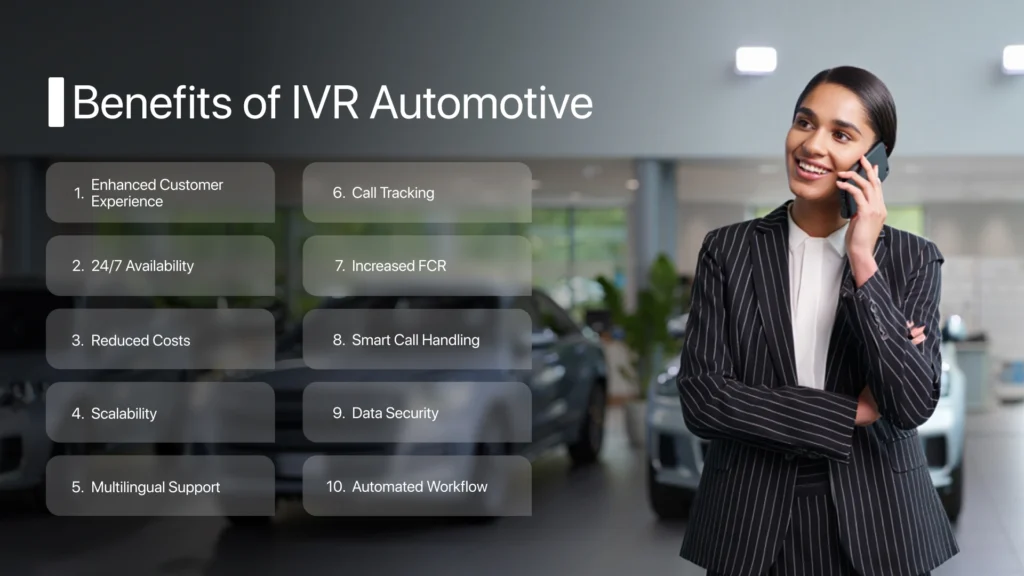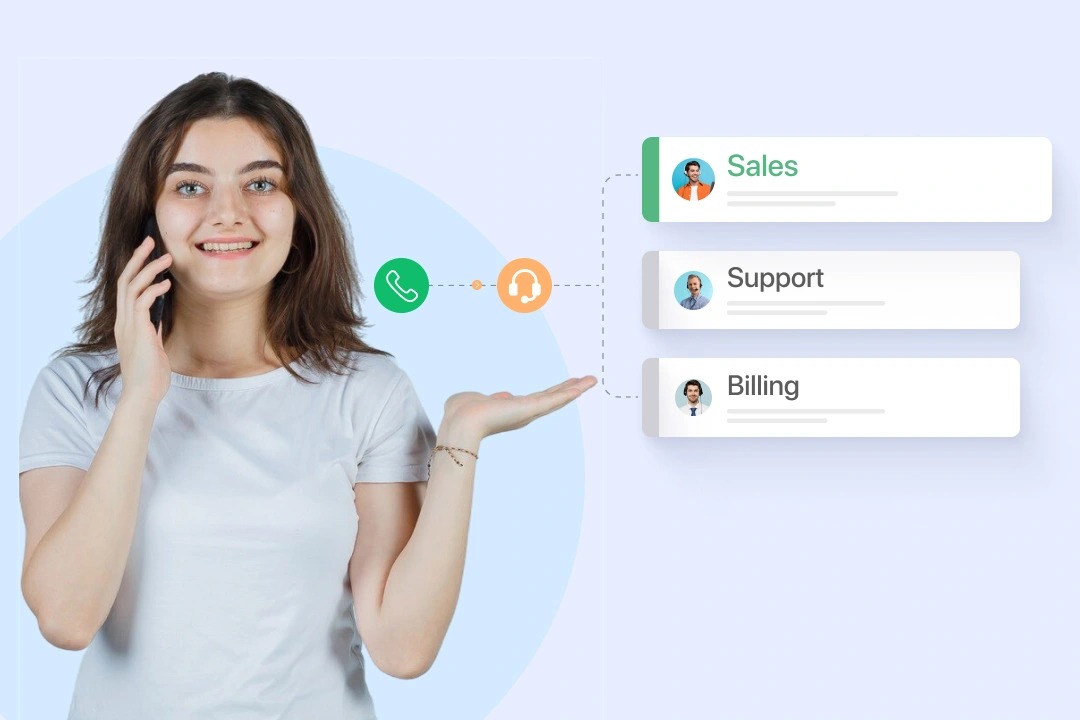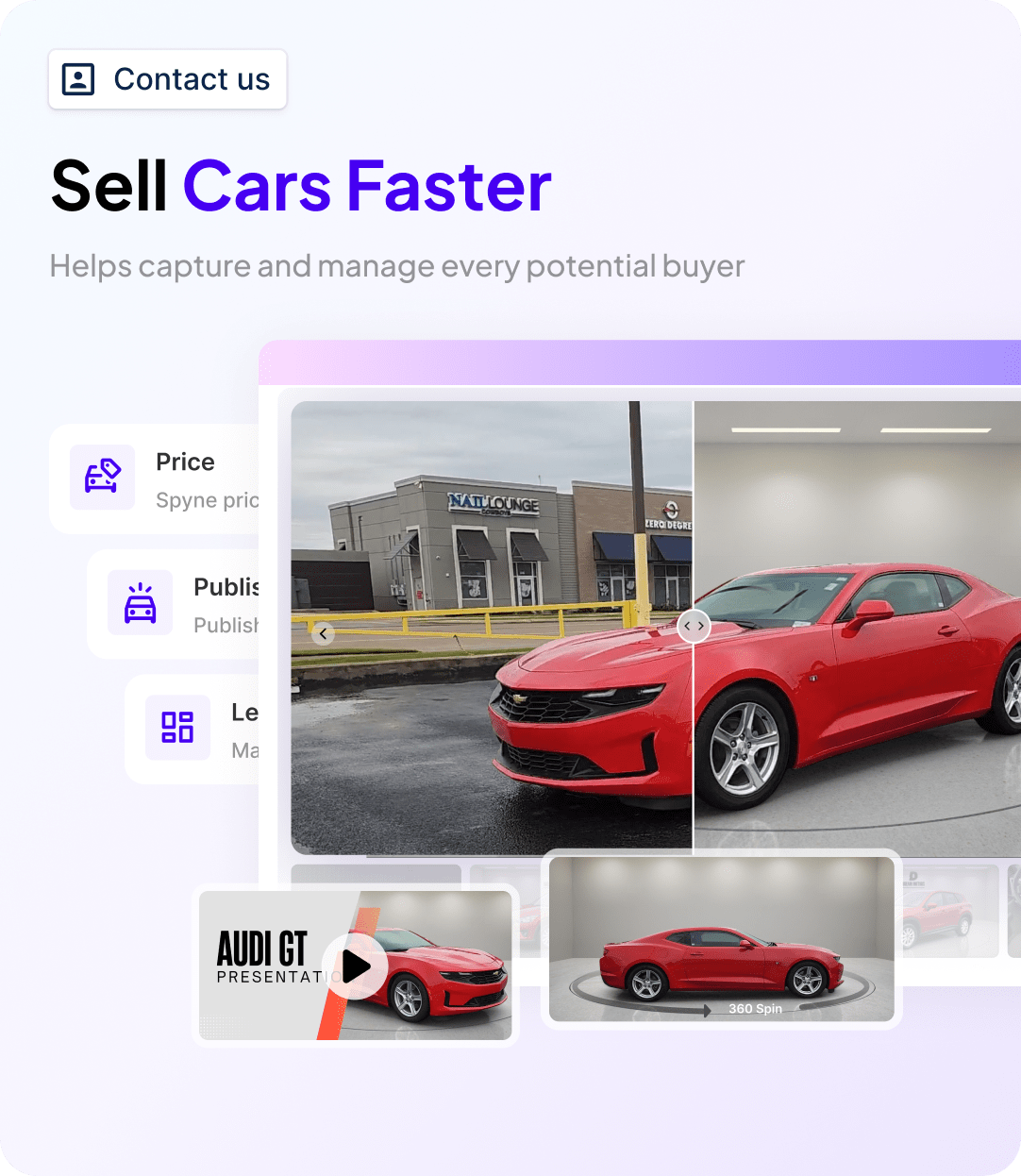You must have come across responses like “Press 1 for Sales,” “Press 2 for Support.” These are nothing but IVR or interactive voice responses. IVR automotive helps car businesses streamline incoming calls by directing customers to the right department without the involvement of human agents. These systems automate incoming call answering, appointment scheduling, and create faster and more efficient personalized customer experiences. Despite these advantages, 73% of customers have an average experience with these automated services, and 63% of customers want personalization in their IVR conversations.
In this blog, we will explore what is IVR, how it works, the benefits it brings to dealerships, and some basic challenges that come along with its usage. Moreover, we will also look into how it enhances the customer experience and drives efficiency and productivity in your automotive business.
What is an IVR Automotive System?
IVR automotive stands for Interactive Voice Response, which is an automated telecommunication system used to interact with customers, providing them with the necessary information they are seeking without the involvement of an agent. The IVR system uses pre-recorded voice prompts, speech recognition, and provides menu options to guide the callers to their preferred services.
The automotive industries IVR services provide 24-hour support and help to reduce the wait times, enhancing customers’ experience. It acts as a virtual auto receptionist that helps dealerships with call routing and answering, collecting customer information, and providing personalized experiences by integrating with existing databases. The IVR auto-attendant system keeps a balance between automation and human touch to deliver the best that customers need.
What are the Additional Resources for IVR Automotive?
The IVR service has several resources that help dealerships manage their customer interactions and provide them with the desired responses. Here are some IVR automotive software resources that support car dealerships in enhancing their call experience.
1. Contact Center Software
An efficient contact center software is necessary for the functioning of the IVR system. The contact management software for car dealerships keeps all the contacts and customer information centralized to create a personalized experience for customers.
2. Call Center Outsourcing
Traditional methods of automotive call center outsourcing help dealerships reduce the overhead charges. It helps to drive results by providing personalized responses to customers across various touchpoints through an IVR phone system.
3. Conversational AI Tools
Customers can be frustrated with the fixed robotic responses they get. The conversational AI tools, such as chatbots and callbots, use interactive voice response examples to deliver responses customized according to their preferences and purchasing habits.
4. Contact Automation Tools
The automation of customer communication is increasing rapidly. The IVR automotive software uses advanced technologies like AI, machine learning (ML), and robotic process automation (RPA) to enhance the customer experience.
5. Outbound Calling Systems
The interactive voice response call center helps the dealership proactively reach out to customers through automated outbound calling systems. This helps in automating the outbound calls, text messaging campaigns, and communication.
Top 10 Benefits of IVR Automotive in 2025
The automotive industries IVR services play a crucial role in improving the customer experience and the dealership’s workflow efficiency. The IVR automotive offers several benefits to dealerships, such as automating incoming inquiries, routing calls, automotive call tracking, and providing round-the-clock support
1. Enhanced Customer Experiences
The IVR meaning in call center is to provide personalized and quick responses to customers, reduce wait times, and minimize confusion. This ensures customers get a smooth experience and feel supported throughout their buying journey.
2. Delivers Responses 24/7
An IVR phone system allows car businesses to provide round-the-clock support, unlike human agents who need breaks and holidays. With pre-recorded answers, automated transactions, and callback options, the IVR calls provide support not only during daytime but also in off-hours and weekends or holidays through the automotive after hours answering service.
3. Reduced Overhead Costs
By automating routine, time-consuming tasks, the IVR auto-attendant system reduces the need for hiring additional staff for handling the customer support requirements. This helps automotive businesses lower overhead costs while maintaining the quality of customer service.
4. Handle High Volume of Calls
During peak hours, IVR systems are capable of handling the large volumes of calls effectively without damaging the quality of customer service. It can scale as your auto business grows by including additional functions and storing data of an expanded customer base.
5. Provides Multilingual Support
Customers contacting the automotive business may come from diverse demographics. With IVR automotive solutions, businesses can offer an omnichannel contact center to provide multilingual support to customers, reducing the language barrier.

6. Call Tracking for Valuable Insights
The IVR call systems track customer interactions and call patterns to gain insights into customer behavior and purchasing habits. These insights are further used to identify the trends and customer needs to make informed decisions and improve the communication strategies.
7. Increases the First Call Resolutions
The IVR call routing features enable dealerships to direct customers to the appropriate person or department based on their requirements. This reduces the frustration among customers and provides them with first call resolution (FCR), increasing their satisfaction levels.
8. Smart Call Handling
The advanced IVR auto-attendant phone system enables smart call handling features like routing incoming calls to the right department, diverting calls to a different number, and tracking call quality and interactions.
9. Data Security Measures
The sensitive customer information is secured and handled carefully. An IVR system for call center verifies the customer’s identity by OTPs or security questions before processing any transaction to avoid any data breaches and payment failures.
10. Automates Communication Processes
For dealerships wondering what does IVR stand for, the interactive voice response goes beyond delivering responses. It automates the inbound and outbound calling process, customer follow-ups, and makes processes faster and more efficient.
How Does an IVR Automotive Software Work?
The IVR automotive system handles the incoming customer calls automatically and directs them to their desired service or department. It uses pre-recorded messages and scripts to greet the customer, followed by providing a menu and resolving their queries. Here is a step-by-step guide to the working of IVR calls.
1. Customer Making the Call
The process of this call routing begins when a customer dials the IVR number of a dealership to get their query resolved.
2. Greeting and Menu Navigation
The caller is then greeted with a welcome message through the IVR phone system instead of a human agent. Subsequently, it presents a pre-recorded menu with several options, such as “Press 1 for billing” or “Press 2 for technical support.”
3. Caller Responding
The caller responds to the message by choosing an option through the keypad or voice commands. The IVR auto receptionist system recognizes the response by a technology called dual-tone multi-frequency signaling (DTMF).
4. Routing the Inbound Calls
The IVR automotive software analyzes your needs and routes your call to the appropriate department for faster resolution or responds to you with a pre-recorded message if it can be solved on its end. In some cases, the call center software for automotive industry makes an outbound call to solve your query and reduce the wait times.
5. Call Analysis
This is not just the end! The modern IVR system for call center not only handles the inbound calls but also tracks the customer interactions to identify the system performance and optimize the strategies for enhanced experiences.
What are the Steps to Create an IVR Automotive System?
Setting up an IVR automotive system is not a complex process and does not require any coding or technical expertise. Moreover, it integrates with your car dealership phone system, too! The IVR call meaning is to reduce wait time and enhance customer experience. With this intention in mind, a well-structured IVR system requires setting up call flow and menu options, personalizing responses, and lastly monitoring it. Here is how you can create the system with ease.
1. Choose the Right IVR Provider
Choose an IVR provider that offers features and capabilities aligning with your dealership’s requirements. It should provide intelligent call routing, call recording, and seamless integration with your existing phone system.
2. Map the Call Flow and Menu Options
Define a simple flow of answering the calls through the interactive voice response call center. Make concise and easy-to-understand menus for customers to avoid any confusion or dissatisfaction in the service.
3. Create and Personalize Your Voice Prompt
The interactive voice response example prompts you enter are the essential elements of your system. Record natural and personalized IVR automotive responses based on the customer data and past interactions.
4. Get Access to Human Agents
In some cases, even the automation cannot handle the problem as effectively as a human agent can. Callers might not get satisfactory service with the automated system; in that scenario, human agents are required to get things sorted.
5. Launch and Monitor Regularly
Conduct thorough testing, and once you figure out the setup, launch your IVR service and start routing the incoming calls. But this is not where your responsibilities end! Monitor and update your system regularly to avoid any delays and disruptions in the calling processes.
Top 5 Use Cases of the IVR Automotive System
The interactive voice response service has become an essential element of business workflows. It helps to streamline customer interactions and automate routine tasks not only in the automotive industry but also across various industries. The following are the most common use cases of the IVR system.
1. Customer Support and Services
The IVR phone system acts as an auto receptionist, providing quick responses, getting accurate information, and scheduling appointments automatically for efficient customer service.
2. Score Leads for Campaigns
In banks and financial processes, the IVR helps customers to check their account balances securely, get transaction history, and make fund transfers efficiently without the need for a human representative.
3. Conduct Customer Surveys
This automated telephone system can be used to collect customer surveys by asking questions with yes or no answers. This valuable feedback helps to make changes and refine strategies.
4. Perform Market Research
The phone surveys and pre-recorded questions help you in doing market research by knowing your customers’ demands and demographics.
5. Managing Inbound Calls and Outbound Campaigns
In businesses, especially dealerships, the IVR automotive solutions automate call routing, lead qualification, and text messaging. This helps car dealers streamline automotive fixed operations and engage customers effectively.
What are the Challenges of Using an IVR Automotive Software?
Despite the benefits IVR automotive software offers, it comes with challenges that could affect the efficiency of customer communications. Understanding these challenges and limitations of the automated system can help dealerships identify bottlenecks and make timely improvements.
1. Complex Navigational Menus
Long, confusing, and unstructured menus can create frustration among customers, reducing their satisfaction levels. This results in hanging up the call, creates a negative image, and reduces the conversion rates.
2. Lack of Human Touch
The IVR service is, after all, software, and it is natural for it to lack the personal touch in conversations. It may not be able to understand complex issues, leaving the customer queries unsolved.
3. Limited Language Support and Voice Recognition
Traditional IVR automotive chat software may struggle with limited language options, making it difficult for dealerships to address a diverse range of customers. In some cases, it may not be able to recognize the voice clearly, leading to miscommunication and dissatisfaction.
4. Integration and Management Issues
The IVR technology can sometimes not integrate smoothly with other systems or modern tools, which creates a gap in call handling processes. Poor call routing and slower responses can reduce the customer experience.
How Does Modern IVR Automotive Solutions Enhance Customer Experience?
The advanced IVR automotive systems are used to deliver quick and personalized services to customers contacting your dealership. Features such as visual menus, support across various channels, and enhanced security are helping to elevate customer experiences.
1. Personalized Conversations
Modern IVR automotive chat systems use CRM data to recognize buyer intent and personalize interactions based on their history. This enables them to create a welcoming and personal experience for customers.
2. Advanced Self-Service Facility
With the use of these automated systems, customers can solve their basic tasks, such as getting account updates and processing payments smoothly. This enhances their self-service experience and resolves their queries without any complicated processes.
3. Omnichannel Communication Support
IVR automotive solutions provide support to customers across various channels, including automotive text messaging, calls, email, website, and social media. This ensures no lead is missed from any of the sources.
4. IVR Support with Visuals
With the increasing use of smartphones, some IVR systems offer visual menus by combining voice support with smartphone touch for easy access to services.
5. Secured Caller Verification
The IVR technology uses biometric authentication, such as voice recognition or asking security questions, for efficient and fast verification of the caller.
How Does Spyne’s IVR Automotive Solutions Improve Your Call Experiences?
Businesses, especially automotive dealerships, need more than traditional IVR features. Spyne offers a comprehensive Retail AI suite that combines automation, personalization, and AI to provide a seamless call experience to customers. This not only increases their satisfaction levels but also drives efficiency and growth to your dealership.
1. Turn Potential Leads into Profitable Buyers
Spyne not just handles the incoming IVR calls, but we also provide advanced AI lead scoring for car dealerships that filters out the high-quality prospects. This enables your team to focus on them and turn potential leads into valuable customers for faster conversions.
2. Natural and Personalized Conversations
With the use of AI technologies such as NLP and machine learning, Spyne IVRs hold human-like conversations. We help your dealership deliver personalized responses to customers to make them feel recognized.
3. Efficient Task Automation
Routine tasks like scheduling service appointments, booking test drives, and following up with customers are automated by Spyne’s automated lead follow up system for car dealerships. This frees up your staff to focus on core sales activities and faster customer resolutions.
4. Always Available for Customers
Spyne ensures your business never misses a customer call. We provide an AI call bot for car dealerships to provide 24/7 customer support even outside working hours, so customers always feel welcomed whenever they contact your dealership.
5. Provides Scalability with Cost-Effectiveness
No matter how big or small your dealership is, Spyne’s IVR automotive solutions scale effortlessly with your business growth and handle large volumes of calls. We bring cost-effectiveness without compromising on the quality of customer service.
6. Avoids the Language Barriers
Spyne’s AI can understand and respond to customer queries in multiple languages. This feature reduces the communication gaps due to language and ensures customers can comfortably interact in their native language.
7. Interacts Across Multiple Channels
From calls to text, emails, and websites, Spyne IVRs integrate seamlessly with multiple communication channels to ensure customers are responded to across various touchpoints.
8. Ensures Smooth System Integrations
Spyne integrates effortlessly with automotive CRM, DMS, and other scheduling tools like calendars. This ensures all customer data is centralized, and dealerships can get full visibility into automotive workflows.
Conclusion
Modern IVR automotive or Interactive Voice Response, has become an essential tool for handling incoming calls for businesses and specifically automotive businesses. IVR calls and services are used to create an enhanced customer experience by automating the answering processes, routing calls to the appropriate departments, and following up with customers on a timely basis. While traditional IVRs offer robotic prompts and complex menus, modern and advanced IVR systems personalize these voice prompts with simple navigational menus to get customer queries resolved faster.
Spyne not only automates call answering but also helps you build meaningful conversations with customers by overcoming the language barrier. Book a free demo with Spyne to scale your operations and customer interactions with ease.
















